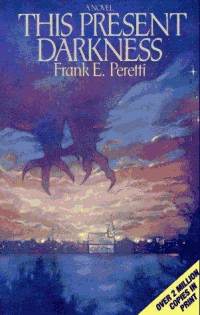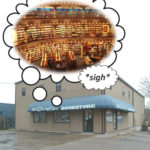Story Evangelism: Top Myths About Christian Novels
 Christians should evangelize. And yet God has saved us people to glorify him in many ways—including work, rest, and the enjoyment of human culture that includes stories.
Christians should evangelize. And yet God has saved us people to glorify him in many ways—including work, rest, and the enjoyment of human culture that includes stories.
That’s one theme of Austin Gunderson’s and my series Should Christian Stories Evangelize?
In October we took four weeks exploring some of the whys of evangelism. We invited guest writers to help explore the topic, and heard from a variety of perspectives.
Now it’s time for a shift. What “story evangelism” is actually in Christian novels, especially fantastical stories? What do we like? Not like? How could things be better? And what are some possible myths about “Christian fiction” as opposed to general fiction?
Austin, I’d like to start by sharing possible myths about Christian stories and evangelism.
 The first myth may be that Christian stories spend all or most of their time John 3:16-ing the reader. No, they don’t.
The first myth may be that Christian stories spend all or most of their time John 3:16-ing the reader. No, they don’t.
Evidence? I think we agree that Frank Peretti’s novels—the angels-and-demons-and-men kind—are awesome. That’s not because those stories do not include the gospel preached. Of course they do. But in the Perettiverse the gospel is 100 percent assumed. God is real. Jesus lived, died, and resurrected. Angels are real. Demons are real and can get you.
The entire story is “evangelizing” you by presuming this is the state of reality.
Eventually Peretti gets to a conversion: once near the end of This Present Darkness, and once as the focal point of Piercing the Darkness. But the words are decoration for images.
I haven’t read many other Christian novels that use John 3:16-style “preaching” or conversion scenes as anything more than garnish, if they appear at all.
 The second myth may be that Christian novels usually spell out the gospel. Often they don’t.
The second myth may be that Christian novels usually spell out the gospel. Often they don’t.
Plenty of the novels I’ve seen or read assume the gospel is real, yes. But then off the gospel goes to be another part of the story’s foundation, along with the understandable rules that Characters Shalt Not Be Seen Going to the Restroom.
E.g., going to the restroom happens, but off-camera. Such a scene would interfere with the story (and stories are most “realistic” when they show reality that has been “edited”).
Even a novel or series themed around specific Christian themes does not spell out the gospel. Steve Rzasa’s The Face of the Deep series explores the Bible and the reemergence of faith in a spacefaring culture. The story cites Scripture texts but does not spell out the gospel. It’s more about the characters and conflicts the Bible provokes.
This is why I crack up when atheists complain about Christian-authored novels and their supposed hyper-religious content. Most of the time the real “offenses” aren’t even there.
![]() The third myth is that Christian novels only evangelize about “conservative” causes such as opposition to abortion, biblical sexual morality, or the goodness of America. Wrong again.
The third myth is that Christian novels only evangelize about “conservative” causes such as opposition to abortion, biblical sexual morality, or the goodness of America. Wrong again.
Right now I am reading a Bill Myers contemporary/sci-fi novel I haven’t read in years called Soul Tracker. It’s about David Kauffman, a non-Christian novelist1 whose daughter dies under mysterious circumstances, which turn out to include a shadowy corporation and a virtual-reality near-death simulator.
In Soul Tracker, Myers touches on life-and-death themes. He might mention abortion once.2 Early in the story he also includes a clear gospel presentation. And he tags a couple of hot topics such as homosexual practice and politicians who despise Christians.
But from there he veers into a surprising subject: the notion of Christians who are so fixated on “truth” that they are not showing unrestrained love for drug addicts, homosexuals and society’s despised.3
In fact, it almost—almost—becomes an uncomfortable level of telling-not-showing. Some characters get “preachy” about how loving God is and how much he respects free will, etc. It’s enough to give you and me, a couple of Reformed or Reformedish chaps, a bad case of the doctrinal grimaces. But hey, it’s not our story, it’s Myers’. Overall I’ve enjoyed it.
So if a person wants to complain about Christians supposedly “evangelizing” not just about the gospel but about only “conservative” issues, that person is actually behind evangelicals on this. We already have books that “evangelize” strongly about “progressive” things.
That is only a start. Your turn again. More myths? Or else legit complaints about Christian novel “evangelism”? And how can this help us find and enjoy better stories? Onward!
- I still don’t know why books sometimes feature heroes who are novelists. It does not seem to aid the plot or add much to the character. ↩
- Possibly that was just my interpretation because of one theme that is incidentally reflected in the Planned Parenthood videos. ↩
- The story actually deals in some stereotypes, including a hypocritical political leader who utters the words “taco-eating queer.” Either this is over-the-top or else exactly the cheesy, uncreative slurs some people do say. ↩










































Good post! Thank you!
What’s interesting to me is how often someone like Frank Peretti is gunned down by evangelical Christians, not non-Christians.
It’s weird – years and years ago, I was part of a counter-cult ministry, and a lot of the people in it decried books like TPD and PTD because of bad theology presented. They said it was anti-Scriptural. And, to a point, I see what they mean.
On the other hand, it’s fiction. Like the ASPCA getting up in arms because Stephen King writes a book in which a wicked character kicks a dog to death, Christians getting upset with Frank Peretti because he fictionalizes the War Unseen is sort of silly. As I said, I get it – some pretty unbiblical ideas are presented in fiction. But no one takes Paradise Lost as a presentation of truth; why is modern fiction treated with a different level of discernment?
So, maybe this sort of tightrope is what makes Christian writers strive to really lay out the gospel message when they do?
I know these things are all reasons I, as a writer, won’t tackle ChristFic. I can’t walk that tightrope, and sound theology doth not good fiction make. I think it takes special ability and talent, and yes, calling, to do that and do it well.
I’m not he.
Agreed.
I’ll put it this way. I love solid teaching and deplore silly nonsense about spiritual warfare. I’m not sure about the idea of prayer giving angelic warriors “health,” video-game fashion, as a theological concept. I definitely don’t believe demons get similar power boosts by, say, Satanic rituals.
Those are things that Peretti’s novels includes, yes.
I would also err far more on the side of “God works His sovereign will” than on the side of “the outcome of events depends on the things you do, including prayer.”
But the problem is not those speculative, fantastical ideas or themes. The problem is people not understanding that they are fiction and supposed to be fiction. Some readers–including but not limited to folks with a more “charismatic” bent–can’t tell the difference. And according to Gene Veith’s 1998 World magazine interview with Peretti, it was Peretti himself who was alarmed by people taking his fun/fantastical elements as anything else.
In fact, that misunderstanding by readers is cited as one reason why Peretti chose to stop writing over angel/demon spiritual warfare novels.
Which I think is a shame. Imagine this premise revisited, with more of the same spectacular spiritual-warfare action and visuals, but also enhanced with the benefit of the author’s experience and learning. Maybe someday!
One thing that does happen that grinds my gears is when an author just blams an emotional problem with some Jesus and auto-magically fixes it, as if someone turned off the psychology in the room.
Horribly abusive childhood? JESUS-BLAM, and there’s no need to recover and learn how to cope with emotional scars and their repercussions!
Marriage problems? JESUS-BLAM, and there’s no need to learn communication or interpersonal skills!
That would be annoying, and I have seen examples of that kind of “moralistic prosperity gospel” from nonfiction books and teachers. The solution to that is to recognize that Jesus, not self, is at the center of the universe, and out of love and obedience to Him follow His word rather than made-up feel-good religion.
However, what Christian novels have you recently read that illustrate this kind of false belief?
Well, for the marriage example I was thinking more of films, specifically Fireproof and what I’ve heard about The War Room, but I remember from the couple of Amish romances I’ve read having the undercurrent of “marry Amish man = happiness even if it isn’t immediate” and “marry English man = quiet miserableness because no holy.”
The one I was thinking of for abusive childhood was……what’s it….Angel Eyes by some amateur lady. Her Love Interest Dude Character had the standard tragic backstory of childhood of drunken-druggie, abusive parents, but there was pretty much no residual effects. I probably would’ve gotten more detail if I could bring myself to read the sequels, but apparently he goes from abused child to well-adjusted teenager through the power of Jesus-blam. I mean, at least we get a few years for this to have taken place, but it’s still seems sketchy to me.
Oh yes, the Jesus-blam. Really hate that myself. But if you point this out to someone who loves a book in which the “Jesus-blam” happens, you will likely get, “Well, Jesus COULD heal a person like that, couldn’t He?” Which leaves you nowhere to go except to hide under a blanket because perhaps YOU are suffering from that same emotional or life problem that the character faced and Jesus hasn’t done any BLAM over you, so you must be deficient, somehow, right?
Another thing that drives me bonkers is the “talky God” syndrome. Characters that constantly have God talking to them in every situation in their lives, like, Don’t worry beloved, you are mine.
How many people does this REALLY happen to? I hope that I’m not the only one that it doesn’t, but I really wonder after I read too many books in which God is providing commentary and encouragement on every thing they do. Again, I want to go hide under a blanket because something must be wrong with me, right?
That must be because you haven’t “trained” well enough to hear His voice …
Which of course is a bit of a problem, because the whole “training” notion isn’t Scriptural and in fact leads to a lot of hurt and wackiness.
Ordinarily I would not mind this notion in fiction. But again, the problem is that if it’s put in there, it’s put in there as a kind of wish fulfillment or effort to show “reality” as we imagine it should/could be. Of course I haven’t seen this in specific novels, at least not that I can remember. Do you mind citing examples — either fantastical Christian ones or otherwise?